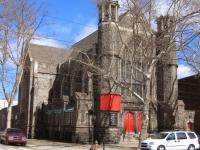The first African American Presbyterian congregation in the United States, appropriately named First African Presbyterian Church, was founded right here in Philadelphia over 200 years ago. A roster of figures notable in Presbyterianism and the African American community in Philadelphia served in the church's ministry, beginning with John Gloucester (1776-1822), a former slave who established the congregation. Since 1910, the John Gloucester Memorial and Historical Society has been dedicated to preserving and promoting the history of Gloucester and of First African Presbyterian Church.
 John Gloucester was born a slave in Tennessee in 1776, but after receiving his freedom he traveled to Philadelphia in 1807. At the time there were only four Presbyterian churches in Philadelphia, and none catering to African Americans--not only in Philadelphia, but in the entire United States. Soon after arriving Gloucester established the First African Presbyterian Church, although it would be two years until the church received its official charter, and two more years before completion of the church's first building at 7th and Shippen (now Bainbridge) Streets.
John Gloucester was born a slave in Tennessee in 1776, but after receiving his freedom he traveled to Philadelphia in 1807. At the time there were only four Presbyterian churches in Philadelphia, and none catering to African Americans--not only in Philadelphia, but in the entire United States. Soon after arriving Gloucester established the First African Presbyterian Church, although it would be two years until the church received its official charter, and two more years before completion of the church's first building at 7th and Shippen (now Bainbridge) Streets.
Over the succeeding centuries, First African Presbyterian Church has moved westward, following patterns of African American settlement in Philadelphia. From 1879 to 1891 the congregation worshipped in a hall on Lombard Street near Broad Street, until building a new church at 17th and Fitzwater Streets, occupied until 1946. After briefly occupying a church at 18th and Christian Streets (1946-1957), the congregation settled at the 42nd Street and Girard Avenue it continues to occupy today.
 After Gloucester, several other prominent ministers presided over First African Presbyterian Church. Rev. John W. Lee, who served First African from 1900 to 1917, also conducted a tent ministry in South Philadelphia, began the first vacation Bible school for black children, and was appointed field secretary of the Board of Home Missions (of the Presbyterian Church in the U.S.A.). Sudor Q. Mitchell, minister during the Great Depression, became the first African American to serve as a member of the Board of Foreign Missions (PCUSA). Shelton B. Waters [pictured], called to the pulpit of First African in 1947, left in 1969 to take an executive position at the synod level. His successor, Kermit E. Overton, became the leader of Black Presbyterians United, founded the journals on black Presbyterianism Periscope and Periscope 2, served as Philadelphia Presbytery moderator, and held important posts within the synod and the General Assembly.
After Gloucester, several other prominent ministers presided over First African Presbyterian Church. Rev. John W. Lee, who served First African from 1900 to 1917, also conducted a tent ministry in South Philadelphia, began the first vacation Bible school for black children, and was appointed field secretary of the Board of Home Missions (of the Presbyterian Church in the U.S.A.). Sudor Q. Mitchell, minister during the Great Depression, became the first African American to serve as a member of the Board of Foreign Missions (PCUSA). Shelton B. Waters [pictured], called to the pulpit of First African in 1947, left in 1969 to take an executive position at the synod level. His successor, Kermit E. Overton, became the leader of Black Presbyterians United, founded the journals on black Presbyterianism Periscope and Periscope 2, served as Philadelphia Presbytery moderator, and held important posts within the synod and the General Assembly.
The John Gloucester Memorial and Historical Society preserves archival materials from First African Presbyterian Church, including minutes, membership materials, correspondence, financial documents, photographs, and various other administrative records of the church, 1863-2014 (bulk from 1950 to 2014). Of special interest in the collection are photographs by John W. Mosley (1907-1969), a self-taught photographer known for capturing images from Philadelphia's African American community. He worked for the Philadelphia Inquirer but also served as official photographer of First African Presbyterian Church.

Children in front of 18th and Christian Streets building, 1946-1957. Photograph by John W. Mosley

William Oglesby, Virginia James, and Commission Representative, 1951 or later. Philadelphia Commission on Human Relations, Fair Employment Practices Commission.
The records of First African Presbyterian Church not only document that particular church and its members, they also track the development of Presbyterianism and of the African American community in Philadelphia. The collection is a great resource for genealogists and local historians as well as scholars of these disciplines.
See all finding aids for John Gloucester Memorial and Historical Society

